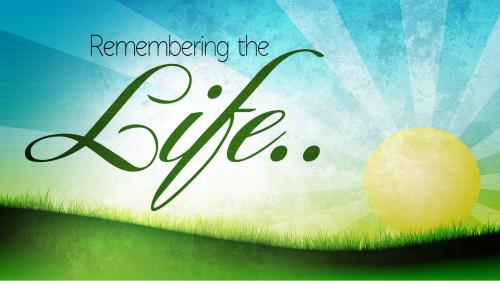-
Don't Hang Up Your Harps & Don't Stop Singing
Contributed by Vincent Oliver on Nov 28, 2017 (message contributor)
Summary: Eulogy for Derro "Smitty" Smith, a faithful church organist. Sermon can be easily adapted to encourage continued Chritian service.
Psalm 137:1-6
“By the rivers of Babylon, there we sat down, yea, we wept, when we remembered Zion. We hanged our harps upon the willows in the midst thereof. For there they that carried us away captive required of us a song; and they that wasted us required of us mirth, saying, Sing us one of the songs of Zion. How shall we sing the LORD’S song in a strange land? If I forget thee, O Jerusalem, let my right hand forget her cunning. If I do not remember thee, let my tongue cleave to the roof of my mouth; if I prefer not Jerusalem above my chief joy.”
The words of our text are the words of a nation of people who have been vanquished by the armies of the Babylonian empire. Their beloved and holy city Jerusalem has been sacked and set aflame. The beautiful temple that was built by King Solomon has been desecrated and left in ruins. And the once proud nation of Israel has been placed in chains and marched away as slaves into a strange and foreign land. The very people who were known throughout the world for their beautiful songs of worship to the God of their salvation, have been reduced to listening to the taunts and ridicules of their captors. The Babylonians had listened carefully to Israel’s songs of praise as they studied their enemy. They heard them as they sang one of the psalms of David. They listened as the Israelites sang: “The LORD is my light and my salvation; whom shall I fear? the LORD is the strength of my life; of whom shall I be afraid? When the wicked, even mine enemies and my foes, came upon me to eat up my flesh, they stumbled and fell. Though an host should encamp against me, my heart shall not fear: though war should rise against me, in this will I be confident. One thing have I desired of the LORD, that will I seek after; that I may dwell in the house of the LORD all the days of my life, to behold the beauty of the LORD, and to enquire in his temple.” They listened and they remembered.
And in celebration of their great victory over Israel these captors mocked the people of God with a cruel request. “Sing us one of the songs of Zion.” And the people of God replied with a question; a question that I believe was directed more to themselves than to their captors: “How shall we sing the LORD’S song in a strange land?“
This sad account of the people of God finds them at one of the lowest points in their rich history. But it lends itself to the occasion of our gathering. I would like to suggest to you that upon a closer examination, there is a message of hope hidden in the text; a message that I want to share with this bereaved family tonight. The psalmist said: “By the rivers of Babylon, there we sat down, yea, we wept, when we remembered Zion. We hanged our harps upon the willows in the midst thereof. For there they that carried us away captive required of us a song.” The psalmist records the question: “How shall we sing the LORD’S song in a strange land?“ I want to encourage this bereaved family by saying: “Don’t Hang Up Your Harps and Don’t Stop Singing.”
1. DON’T STOP SERVING.
First of all, I need you to hear me when I say DON’T STOP SERVING. In verse 2 we read, “We hanged our harps upon the willows in the midst thereof.” The words of the psalmist creates for us a very visual image of weeping saints standing at the edge of the river in the midst of weeping willow trees. Their heads were hung in shame and defeat, and he says “there they hanged their harps.” It was there at the river’s edge among the willows, in a mood of spiritual dejection and defiance that they decided to hang up their instruments of music and worship. Those who made this decision to were the minstrels. Like Brother Smitty, they were the music makers who played for the singers and aided the worship in the temple. They had once provided a valuable service to people of God and the work of the Lord. Two things caught my attention in the text and they both speak of a future hope:
A. Instinctively, these prisoners brought their harps with them on their march into captivity. So somewhere in their the back of their minds, even though their city and their homes had been destroyed, even though they were now in chains being led away into a strange land, they remained hopeful that the time would come when they would be able to play the Lord’s songs once more. Even in times of sorrow and mourning God will give you a ray of hope.

 Sermon Central
Sermon Central



